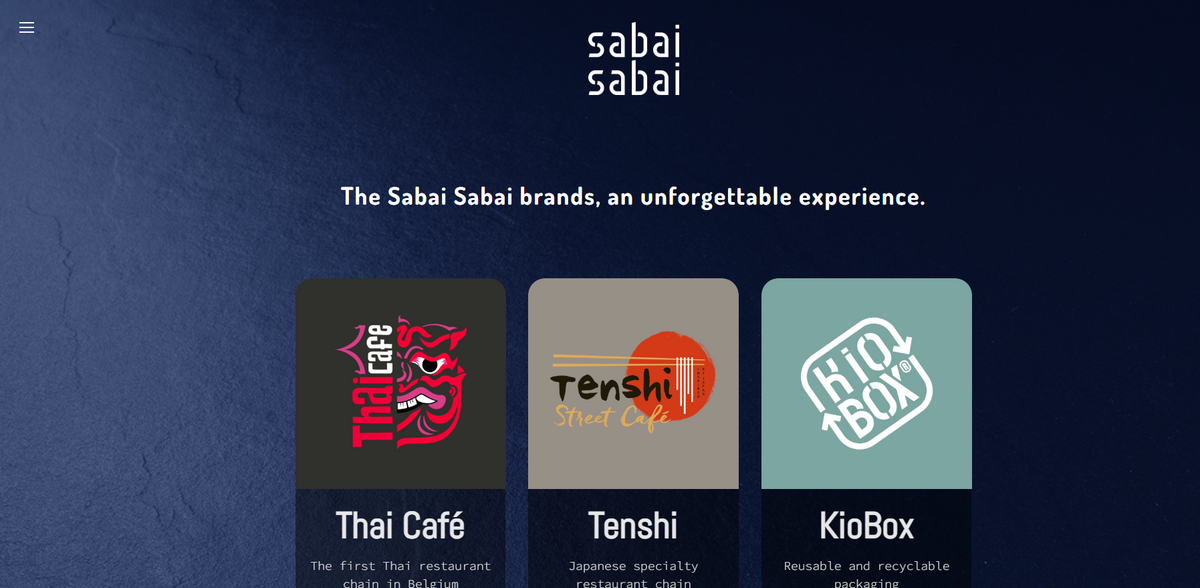What is the Project?
The SABAI SABAI project is the parent company that unites the restaurant groups Thai Café and TENSHI under one roof, delivering an unforgettable Asian culinary experience in Belgium. This is the first Thai restaurant chain in the country with a strong commitment to dynamic and authentic Thai cuisine. Thai Café, with its stunning flavors combining sweet, salty, sour, and spicy ingredients, offers a meal that includes rice, fish, soup, spicy salad, vegetables, and a choice of meat. As described, the art of Thai cuisine is expressed through an extraordinary combination of fresh ingredients and local organic produce. Furthermore, TENSHI thrives as a Japanese specialty restaurant chain, adding to the diverse and authentic dining options under the SABAI SABAI umbrella. The project also includes the innovative KioBox – a reusable and recyclable packaging solution designed to replace single-use plastic boxes.
Main Benefits
The project is not only about exceptional food but also about environmental commitment and community development. Key figures and facts include:
- Lightweight packaging that is unbreakable and waterproof
- Stackable and aesthetically pleasing container design
- Low tech concept based on a deposit system
- Huge enthusiasm from customers
- KioBox has saved more than 5 million single-use plastic boxes from entering the oceans
Thai Cuisine Experience
Thai Café represents a true celebration of Thai cuisine. The restaurant uses the finest ingredients – farmers source produce that is fresh, organic, and pesticide-free, coming as much as possible from small local growers. The cuisine combines the best of Chinese and Indian gastronomic traditions, which results in a vibrant tapestry of flavors. Every dish is an artful presentation that reflects near-perfection from the blend of aromas, spices, and colorful presentation. There is something wonderfully engaging about a meal that transports taste buds to a different world… a delightful experience that is both casual and refined.
Community and Local Sourcing
From its inception, the project has emphasized the importance of community by sourcing ingredients as locally as possible. Local producers play a vital role in this initiative, ensuring that products such as meats and vegetables maintain the highest quality available while supporting nearby farms. The approach not only nurtures regional economic growth but also reinforces the commitment to sustainable practices. The short supply chain, exemplified by sourcing from sources like the Grocer de Croock for fresh, organic products, is a cornerstone of the project. It stands as a testament to the dedication towards preserving quality and ensuring that environmental impact is minimized.
Innovation in Packaging
Faced with the lack of acceptable and practical packaging solutions for take-away and delivery, the SABAI SABAI group developed the complete line of KioBox packaging and tableware. This eco-friendly packaging is thoughtfully engineered from WPC (Wood Plastic Compound) – made up of 25% oak particles and 75% ABS – ensuring that each plate and bowl is durable enough to be used and re-used through hundreds of cycles. With a simple deposit system, customers return the packaging, which in turn is recycled into small plastic pellets and re-injected into new products. The use of KioBox has been transformative by reducing waste and demonstrating that sustainability and innovation can go hand in hand… making a positive impact on the planet.
Farming and Zero Waste Approach
The project stands out for its commitment to farm-to-table practices that have been honed over 20 years. The approach is simple yet effective: actively support the local community and ensure the freshest, organic, and pesticide-free products are available. The link between sourcing high-quality ingredients and reducing environmental impact is clear. Equally impressive is the pursuit of a zero waste solution through innovative packaging technologies. This dedication to sustainability and excellence has been built into every step of the process, from the meal itself to each bowl and plate served in KioBox. Every element of the project speaks to a desire to care not only for customers but also for the environment.
Project Impact
- SDG 2: Zero Hunger – by sourcing fresh, organic, and locally grown produce.
- SDG 12: Responsible Consumption and Production – through the reuse of KioBox packaging and reduction in waste.
- SDG 13: Climate Action – by reducing single-use plastics and promoting sustainable practices.
- SDG 14: Life Below Water – by saving millions of plastic boxes from entering the oceans.
- SDG 17: Partnerships for the Goals – reinforcing the role of community and local suppliers.
Future Growth and Vision
Looking ahead, the SABAI SABAI project is poised for further expansion with ambitious plans already in place. With the first phase of the crowdfunding campaign ending on July 21st with notable success, a new Thai Café has opened in Ixelles Cemetery on July 18th, and another is set to open around August 20th on Rue du Luxembourg. Soon, work will begin on another outlet near Bowling Stones in Wemmel. The long-term plan envisions the opening of 15 new restaurants over the next five years, driving significant growth and increasing the company’s value. This exciting vision, supported by the lasting enthusiasm of loyal customers and investors alike, speaks volumes about the future of this innovative project and its commitment to sustainable practices, exceptional dining, and community involvement.





















